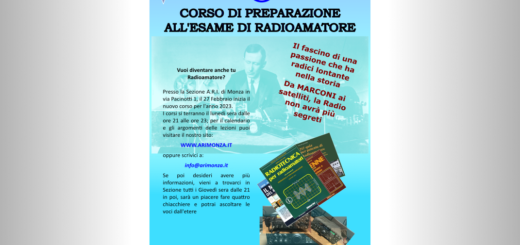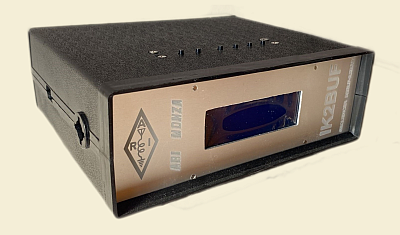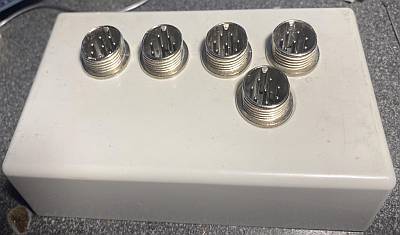21 Novembre 2019
ARISS school contact planned for Milano and Merone, Italy
An RISS school contact is planned for Luca Parmitano KF5KDP with Istituto San Paolo delle Suore Angeliche, Milano, Italy and Istituto Comprensivo Di Merone – Mons. A. Pirovano, Merone, Italy.
The event is scheduled Thursday November 21, 2019 at approximately 09.12 UTC, which is 10.12 CEWT.
The telebridge contact will operated by W6SRJ in California, USA. Downlink signals will not be audible in Europe.
The contact will be conducted in Italian.
The event will be web streamed on: – Istituto San Paolo delle Suore Angeliche Milano: www.arierba.it/ariss_live/ – Istituto Comprensivo Di Merone: www.arierba.it/ariss_live_2/
This ARISS-Europe News Bulletin is circulated to 2740 subscribers.
School Information:
Istituto San Paolo delle Suore Angeliche
Private school in Milano city, our students are children from 1 to 13 years (nursery, kinder garden, primary, secondary 1st level).
Istituto Comprensivo Di Merone – Mons. A. Pirovano
The School is an Istituto Comprensivo, it means that includes 3 school levels: primary, elementary and junior school (Scuole Medie). It is located between three municipalities: Merone, Lambrugo and Monguzzo, but the logistic offices are in Merone. Merone is a small town between Como and Lecco, north of Italy. The junior school is composed by different kind of school hours from 30 hours, base level, to 38 hours, that are managed with some laboratories, in particular three scientific ones.
Students First Names & Questions:
Istituto San Paolo delle Suore Angeliche and Istituto Comprensivo Di Merone – Mons. A. Pirovano
1. Come interagisci con CIMON? Capisce se sei triste o felice e ti parla?
2. Quali sono gli strumenti che utilizzi di più nel tuo lavoro?
3. Cosa fate voi astronauti durante le manovre di reboost?
4. Chi o che cosa può trarre vantaggi dalle missioni dell’uomo nello spazio?
5. E’ mai stata osservata la metamorfosi di un insetto sulla ISS? Ci sono differenze con quanto accade sulla terra?
6. Com’è cambiata la tua vita, anche in senso pratico, dopo essere stato nello spazio?
7. Che risultati stanno dando le coltivazioni sull ISS? Si riesce a ricavare del cibo?
8. Si vede lo scioglimento dei ghiacciai dalla ISS? Come sta il pianeta Terra secondo te?
9. In cosa consistono le responsabilità e gli incarichi di comandante?
10. Avete mai visto un buco nero?
11. In quante lingue diverse comunicate tra di voi e con i controlli di terra?
12. Quale è il periodo di tempo più lungo trascorso da un astronauta nello spazio?
13. Nello spazio si ha una percezione diversa del tempo?
14. Paradosso di Enrico Fermi o equazione di FranK Drake: cosa ne pensa?
15. La ISS inquina nello spazio?
16. Tra poco dovremo fare l’importante scelta della scuola superiore. Come hai fatto tu a scegliere?
17. In base alla tua esperienza, è più difficile adattarsi alla microgravità oppure riabituarsi alla gravità terrestre al rientro?
18. Se potessi tornare indietro nel tempo, rifaresti tutto ciò che hai fatto finora?
19. Nei momenti liberi vi divertite con la microgravità?
20. Che sensazione prova a “vivere in due mondi”, uno con la gravità e uno senza?
21. Per quanto riguarda le sensazioni, il sonno nello spazio è diverso?
22. Cosa ne pensi della possibilità di costruire una base operativa sulla Luna?
23. Se fossimo pronti ad inviare un equipaggio su Marte, tu vorresti farne parte?
24. Ci racconti che emozioni provi osservando la Terra dalla ISS?
About ARISS:
Amateur Radio on the International Space Station (ARISS) is a cooperative venture of international amateur radio societies and the space agencies that support the International Space Station: NASA, Russian Space Agency, ESA, JAXA, and CSA. The US Center for the Advancement of Science in Space (CASIS) and the National Aeronautics and Space Administration (NASA) provide ARISS special support.
ARISS offers an opportunity for students to experience the excitement of Amateur Radio by talking directly with crewmembers on board the International Space Station. Teachers, parents and communities see, first hand, how Amateur Radio and crewmembers on ISS can energize youngsters’ interest in science, technology, and learning.
The primary goal of ARISS is to promote exploration of science, technology, engineering, and mathematics (STEM) topics by organizing scheduled contacts via amateur radio between crew members aboard the ISS and students in classrooms or informal education venues. With the help of experienced amateur radio volunteers, ISS crews speak directly with large audiences in a variety of public forums. Before and during these radio contacts, students, teachers, parents, and communities learn about space, space technologies, and amateur radio. For more information, see www.ariss.org, www.ariss-eu.organd www.amsat-on.be/hamtv-summary/.






